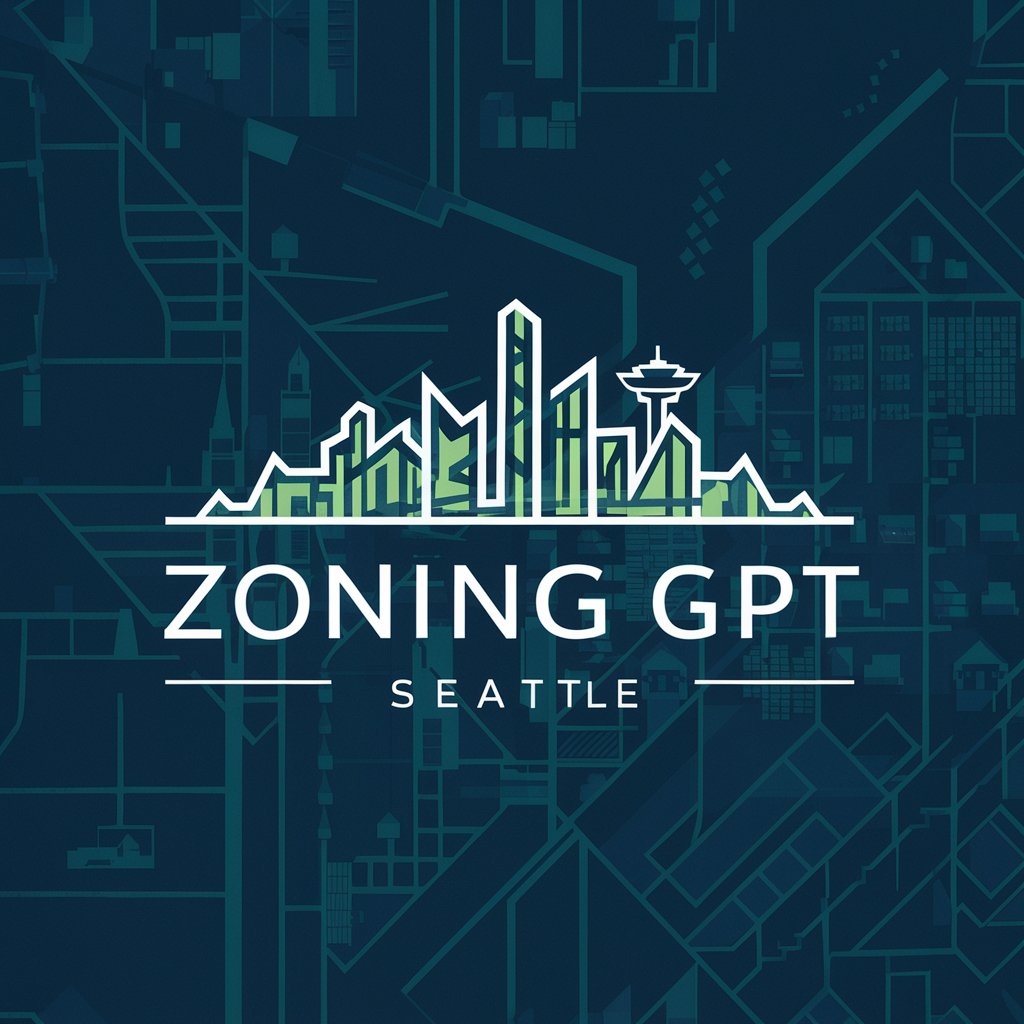
Zoning - Seattle - Seattle Zoning Guidance

Welcome! How can I assist with your Seattle zoning queries today?
Navigating Seattle's Zoning Complexities
What are the zoning requirements for residential neighborhoods in Seattle?
Can you explain the floor area ratio (FAR) regulations in downtown Seattle?
What are the height limits for commercial zones in Seattle?
How do Seattle's zoning laws address environmentally critical areas?
Get Embed Code
Introduction to Zoning - Seattle
Zoning - Seattle is a specialized AI designed to interpret complex legal zoning texts specifically for Seattle, WA. It serves various stakeholders involved in urban planning, such as city planners, policy makers, housing advocates, and real estate developers. This AI is equipped to provide detailed analyses of zoning requirements such as maximum and minimum heights, floor area ratios, setbacks, and more, directly from the Seattle Municipal Code. For instance, in analyzing the use of land under different zoning designations (e.g., Residential, Commercial, Industrial), Zoning - Seattle can interpret the implications of these classifications on development parameters and compliance. Powered by ChatGPT-4o。

Main Functions of Zoning - Seattle
Zoning Requirement Analysis
Example
Determining the floor area ratio (FAR) permissible under a specific zoning classification like Downtown Retail Core or Seattle Mixed-University District, which can be crucial for developers in assessing potential building size and land use efficiency.
Scenario
A developer planning to build a commercial property in the Downtown Mixed Commercial zone would use Zoning - Seattle to confirm the maximum allowable building height and FAR, as well as any special conditions linked to the historical or environmental significance of the site.
Interpretation of Complex Zoning Laws
Example
Clarifying the application of 'overlay districts' which can modify the basic zoning rules in certain parts of the city, such as additional height restrictions or environmental protections.
Scenario
A policy maker could consult Zoning - Seattle to understand how the Mandatory Housing Affordability provisions affect a proposed residential development in a Neighborhood Commercial 2 (NC2) zone.
Support for Rezoning Applications
Example
Analyzing the criteria and potential outcomes of rezoning applications, such as changing a parcel's designation from Industrial to Residential-Commercial.
Scenario
A housing advocate might use Zoning - Seattle to evaluate how changing a parcel from General Industrial to Residential Multifamily Midrise could impact local housing availability and community character.
Ideal Users of Zoning - Seattle Services
City Planners
City planners benefit from Zoning - Seattle by using its capabilities to ensure that urban development projects comply with local zoning laws, thus facilitating efficient city planning and development management.
Real Estate Developers
Real estate developers utilize Zoning - Seattle to assess the feasibility of their projects based on zoning restrictions and potentials, helping them to optimize their investment strategies and development plans.
Housing Advocates
Housing advocates use Zoning - Seattle to understand how zoning regulations affect housing availability and affordability, aiding them in advocacy for more inclusive zoning practices.

Guide to Using Zoning - Seattle
Visit yeschat.ai
Start with a free trial at yeschat.ai; no ChatGPT Plus or login required.
Define your query
Clearly state your zoning-related question or the specific information you need regarding Seattle's zoning laws.
Utilize features
Use the tool's capabilities to explore detailed zoning regulations, including land use, building heights, setbacks, and more.
Review results
Carefully review the provided zoning information and cross-reference it with official Seattle zoning maps and documents for accuracy.
Apply knowledge
Use the obtained zoning information to assist in planning projects, making informed decisions, or in academic and professional research.
Try other advanced and practical GPTs
Seattle Restaurant Recommendations
Discover Seattle’s Best Eats, AI-Powered

Sober in Seattle
Navigating Recovery with AI

Settle In Buddy
Navigate Your Move with AI

Copywise
Crafting Tomorrow's Copy Today

Portrait Creator(似顔絵クリエイター)
Craft Your Digital Likeness with AI

Conveyance AI
Streamlining Conveyancing with AI

Seattle Sound Scout
Explore Seattle's music scene with AI

Food in Seattle
Explore Seattle’s best eats with AI

Seattle Public Schools GPT
Empowering Education with AI

Pyth-on Point
Streamlining Python Coding with AI

Bahamas Visitor Guide
Your AI-Powered Guide to the Bahamas

ASK GPT- Business Visitor to Canada in 2024 ?
Your AI-Powered Gateway to Canada

Frequently Asked Questions about Zoning - Seattle
What zoning designations are used in Seattle?
Seattle utilizes various zoning designations such as Residential, Commercial, Downtown, Industrial, and Special Review Districts, each with specific regulations and allowed uses.
How can I find out what my property is zoned as?
You can find out the zoning of a property in Seattle by referencing the Official Land Use Map or using the Seattle Municipal Code, Chapter 23.30.
What are the height limits for buildings in downtown Seattle?
Building height limits in downtown Seattle vary by specific zone designations and may include high-rise limits, subject to conditions like mandatory housing affordability provisions.
Can I convert a single-family home into a multi-family dwelling in Seattle?
Conversion of single-family homes into multi-family dwellings is regulated under specific residential or multi-family zones and often requires adherence to zoning criteria like lot size and neighborhood character.
What are mandatory housing affordability (MHA) requirements in Seattle?
MHA requirements in Seattle mandate that new developments include affordable housing options or contribute to a city fund dedicated to affordable housing, depending on the scale and location of the development.